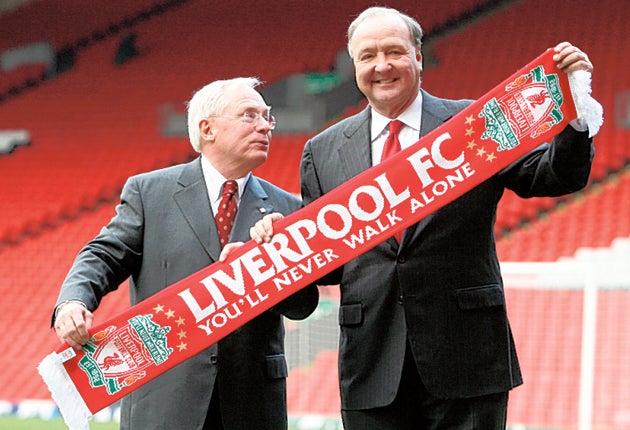Premier League chairmen call for debt cap

Premier League chairmen last night called for a debt cap to prevent clubs sliding into the distinct, but related problems suffered by Liverpool and Portsmouth.
David Gold, co-owner of West Ham, said, “There are 12 clubs whose owners, when they go to bed, do so with fear. Half the clubs in the Premier League are over-leveraged and could go into administration if it goes wrong. You can have a budget, and your debt, but it goes pear-shaped when you get relegated.
Gold added: “You can argue Portsmouth built debt to cheat. They outbid people [with money they did not have] to buy players, is that not cheating? But they built up so much debt the business collapsed.”
Steve Morgan, the owner of Wolves who tried to buy Liverpool four years ago but was rebuffed, criticised the current Liverpool owners, Tom Hicks and George Gillett, for purchasing the club by loading it with debt, arguing such methods should not be allowed.
“Football is a business in which future income is in the hands of guys on the pitch. When you have interest bills of $40-50m before you kick a ball that is a hell of a hurdle. I don’t see football clubs should be leveraged to that extent,
“If you knew the situation what has happened was predictable, but I don’t think anybody realised the extent to which the club was leveraged. Liverpool needed a new ground, or major refurbishment of the existing ground, they needed significant investment in the team, and that co-incided with a major leverage of debt. With hindsight it was a perfect storm, and it blew.”
Both men agreed with a different American speaking at the Leaders in Football Conference, at Stamford Bridge, Dave Checketts. The owner of the NHL team St Louis Blues, and US MLS soccer team Real Salt Lake, said: “American investors, for the most part, are afraid of the Premier League because of excessive debt and a lack of limitation on salaries. The debt levels are not acceptable in professional sports. Owners should come together and say, “this league should not have more than X amount of debt on any one club”.
Checketts said: “In the NFL there is a $150m debt ceiling on a club. If a new owner pays $1bn for the Miami Dolphins, as happened, he has to come up with a huge equity check.”
Checketts criticised his compatriots for failing to build a relationship with supporters, but anticipated John William Henry, of the New England Sports Venture, would.
However, he warned, the Red Sox owner would be buying into Liverpool as an investment, not as a vanity purchase (as might be said of Roman Abramovich or Manchester City’s Arab owners).
“Most Americans have seen buying English Premier League clubs as an investment,” said Checketts. “They understand the passion that exists for football here and see this as an investment opportunity to invest in and then to exit from. They see it strictly that way. Like most American sports owners they [also] think they are going to do a great job, win many championship and be a big hero, but in many cases - see Liverpool - it does not work out.”
Checketts, who said he had previously tried to buy a Premier League club, and envisaged he would try again, added: “I don’t think [Gillet and Hicks] built relationships with fan groups, I don’t think they listened. Fans of Liverpool should be excited by what [Henry’s] group did with a leading franchise in the US. The Boston Red Sox were moribund with a dated stadium. This group put millions of dollars into [rebuilding] Fenway Park, they built a great rivalry with the Yankees, from a business and public relations aspect they did a superb job, and they put a high value on performance on the pitch. I think they will repeat that with Liverpool and I think they will be excellent owners.”
Subscribe to Independent Premium to bookmark this article
Want to bookmark your favourite articles and stories to read or reference later? Start your Independent Premium subscription today.

Join our commenting forum
Join thought-provoking conversations, follow other Independent readers and see their replies